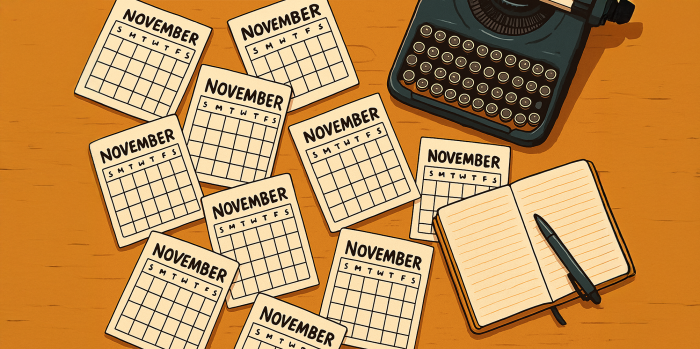The writing community recently lost Nanowrimo, short for National Novel Writing Month. Its goal was to encourage writers to hold themselves accountable to writing 50 thousand words in 30 days. There were different community boards set up by genre or region, for writers to join, participate, give and receive encouragement. Unfortunately, the non-profit organization closed down earlier this year for financial reasons.
A replacement has emerged. Novel November is being run by Pro Writing Aid, a grammar software company. They will have three phases, filled with training opportunities, and a dashboard to help you keep track of your writing. October will be “Preptober” where authors can plan and plot their novel. There will also be a post phase in December where writers will learn about editing and publishing their novel.
Prepare in October, write in November, then edit and polish in December. Sounds like a good plan, except it’s difficult to produce 1667 words per day for 30 days. Whether you succeed in writing 50,000 words, or not, the purpose should be to make strides toward your goal. Or to help you develop the habit of writing daily. For many writers, it takes years to complete their first novel.
This is my opinion: Nanowrimo was for plotters, not pansters. So is Novel November. But it can be for both types of writers.
THE PLOTTER PLAN.
The goal is to write 1667 words a day. That goal is easier to achieve if you have a thirty chapter outline and know what is happening in each chapter. Then you write one chapter per day with the goal of writing 1500 to 2000 word chapters.
THE PANTSER PLAN.
But I’m a panster, and I want to do Novel November. How can I be successful?
Step 1.
Know where your story is going by writing your last chapter first. Do this during Preptober. It’s not cheating, it’s preparing for success.
Step 2.
Decide where your story begins. Who is your protagonist and antagonist? Who are their side kicks. What is the inciting incident? What drives each character? You don’t have to write it down, but it helps to know these things.
Step 3.
Think of at least five events which will occur between the beginning and the ending you have already written. Don’t worry if they change. You’re a panster so they probably will. Every video game has side quests, road trips require unexpected detours. These are opportunities to add more words.
Step 4.
Write. I find it’s best to write in the morning and review your last chapter before bed each night. After reviewing, ask yourself what will happen next. Let your subconscious mind work for you. Often, I wake up with an idea for where the story goes next.
![]() Tip One. What if I get writers block and have no idea where the story goes next? Jump ahead to the next event and write it. When you write the next scene, the story path to get there will become visible and the writers block will disappear.
Tip One. What if I get writers block and have no idea where the story goes next? Jump ahead to the next event and write it. When you write the next scene, the story path to get there will become visible and the writers block will disappear.
![]() Tip Two. Hold yourself accountable for writing each day. Set aside a special time and place, where you will not be interrupted. Resist the temptation to check your word count until you are finished each day.
Tip Two. Hold yourself accountable for writing each day. Set aside a special time and place, where you will not be interrupted. Resist the temptation to check your word count until you are finished each day.
![]() Tip Three. Be realistic. This will not be a completed novel. It is the first draft. Don’t spend time editing or rewriting. This is you telling the story to yourself, so get it down on paper. December is the time for editing, finding plot holes, and rewriting.
Tip Three. Be realistic. This will not be a completed novel. It is the first draft. Don’t spend time editing or rewriting. This is you telling the story to yourself, so get it down on paper. December is the time for editing, finding plot holes, and rewriting.
If you would like to participate in Novel November CLICK HERE TO SIGN UP.
- How Long Should A Chapter Be? - November 21, 2025
- Don’t Edit Too Early - November 14, 2025
- Waiting for the Muse - November 10, 2025

